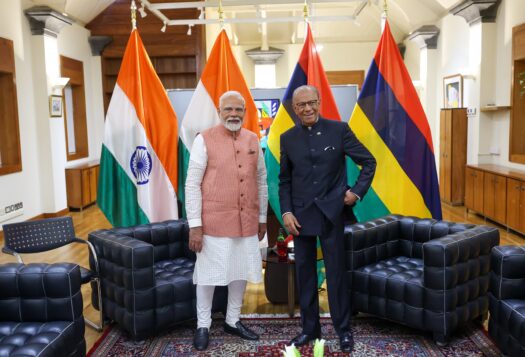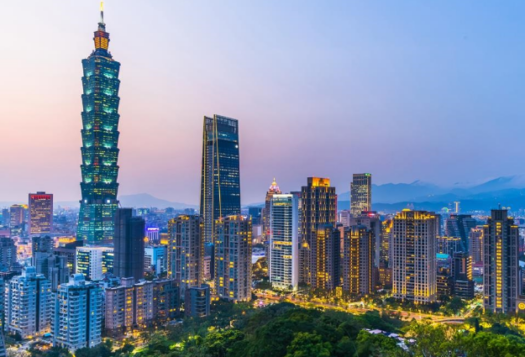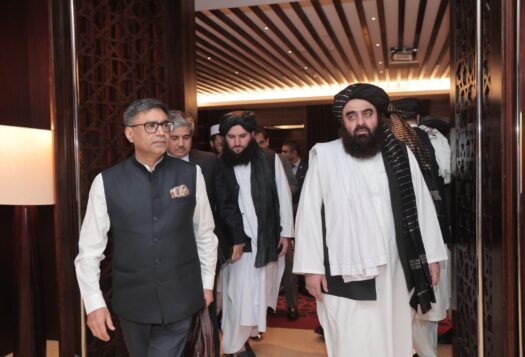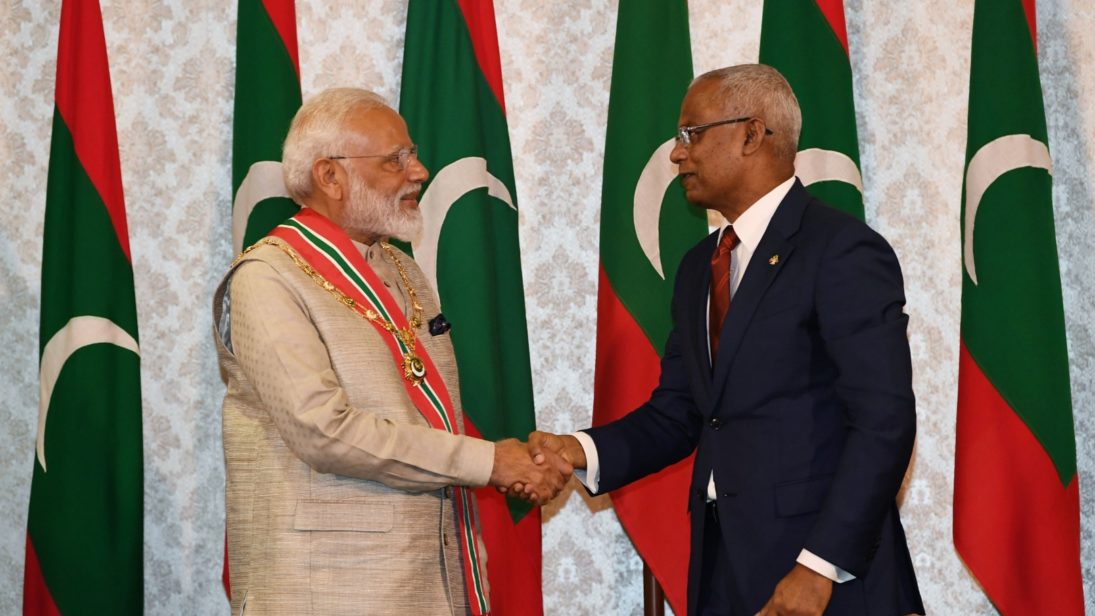
Inkeeping with his “neighborhood first” policy, Prime Minister Narendra Modi touredthe Maldives and Sri Lanka from June 8-9, the inaugural foreign visit of hissecond tenure. This visit seemed prudent since despite Modi’s aggressiveoutreach to the neighborhood in his first tenure, a recurrent perception ofIndia as a regional hegemon among its neighbors as well the lure of Chinese aidand investment in the subcontinent have posed challenges for New Delhi. Thus, whatthis recent visit to the Maldives and Sri Lanka indicates about India’s prioritiesin its neighborhood in Modi’s second tenure and its strategy in the Indo-Pacificregion merits reflection.
Winning Back the Neighborhood
India’sgrowing regional and global aspirations have often been accompanied by doubtsregarding its ability to influence favourable outcomes in its neighborhood.Being the largest country in South Asia, geographically and population-wise, aswell as the most developed economically, India is expected to assumeresponsibility for the region. However, India’s own material and diplomaticshortcomings coupled with the insecurity among its smaller neighbors pertainingto India’s unchallenged clout in the region have not made this task easy forNew Delhi. The perennial foreign policy conundrum for India in its neighborhoodremains how to shape regional politics while fixing its image of a “big brother.”
Whilethe neighborhood has always been prominent in India’s foreign policycalculations, it has now assumed a wider geopolitical significance, givenChina’s increasing economic and strategic interest in these countries, such as throughthe Belt and Road Initiative (BRI).
With this context in mind, Modi’s choice of destination for his first foreign visit after re-election does not seem random or coincidental. The political regimes in both the Maldives and Sri Lanka in recent years were seen as taking their countries closer to a strategic embrace with China, at the expense of ties with India. However, President Maithripala Sirisena in Sri Lanka and President Ibrahim Mohamed Solih of the Maldives have reversed course and been relatively well-disposed towards India. Though this certainly does not amount to Colombo and Male freezing Beijing out, it does create traction for New Delhi to gain some lost ground in the neighborhood. Thus, Prime Minister Modi’s recent visit to these countries can be seen as: one, consolidating the gains India has made in these countries recently and precluding further Chinese inroads into these Indian Ocean littorals; second, demonstrating that India’s utmost priority is its immediate neighborhood; and third, framing these countries as critical nodes in India’s Indo-Pacific strategy.
Maldives: Critical Node in India’sMaritime Strategy
India-Maldives relations, which faced rough storms and were almost broken during the tenure of former President Abdullah Yameen, have only recently been restored, under the Solih regime. In fact, the Solih government has propounded an “India first” policy, focused on “re-igniting the India-Maldives friendship” and “exploring new avenues while strengthening existing links.” Though such a pronouncement certainly does not imply a break of engagement with Beijing, it does exude a political bonhomie that should be leveraged by New Delhi to both solidify the relationship as well as achieve its regional objectives.
Prime Minister Modi’s recent visit to the Maldives and Sri Lanka can be seen as: one, consolidating the gains India has made in these countries recently and precluding further Chinese inroads into these Indian Ocean littorals; second, demonstrating that India’s utmost priority is its immediate neighborhood; and third, framing these countries as critical nodes in India’s Indo-Pacific strategy.
New Delhi is looking to incentivize Indian Ocean countries to become part of an India-led maritime security initiative that employs a multilateral approach to maintaining peace and stability in the region. The Maldives is an important partner for India in this endeavor and the Coastal Surveillance Radar System (CSRS) built by India in the Maldives and jointly inaugurated by Prime Minister Modi and President Solih during this visit should be seen in this context. The Maldives joins other Indian Ocean littorals like Seychelles, Mauritius, and Sri Lanka that are already part of India’s network of CSRS. In addition, the Indian Navy and the Maldives National Defence Force signed a Technical Agreement on Sharing White Shipping Information. These two developments would strengthen India’s maritime domain awareness in the Indian Ocean region (IOR). India and the Maldives also pledged to step up “coordinated patrolling and aerial surveillance, exchange of information, and capacity building” in the IOR, securing their strategic maritime partnership.
Another focus of Modi’s visit to the Maldives was to emphasize India’s inclusive vision of SAGAR (Security and Growth for All in the Region) in the Indo-Pacific, especially in contrast to China’s development model that is self-serving and makes countries vulnerable to debt. While addressing the Maldivian parliament, in an indirect reference to China’s connectivity projects in the region, Modi said, “…our development partnerships are to empower people, and not to weaken them. Nor to enhance their dependence on us. Nor indeed to impose the impossible burden of debt on the shoulders of generations yet to come.” In this connection, India offering Maldives a USD $800 million line of credit agreement for social and economic development, a grant assistance of USD $5.5 million, and a cash grant of USD $6.9 million significantly demonstrates that New Delhi is focusing on people-centric and need-based projects in the region as compared to big-ticket Chinese projects that have a way of accumulating debt that these countries are unable to repay, paving the way for undue Chinese influence.
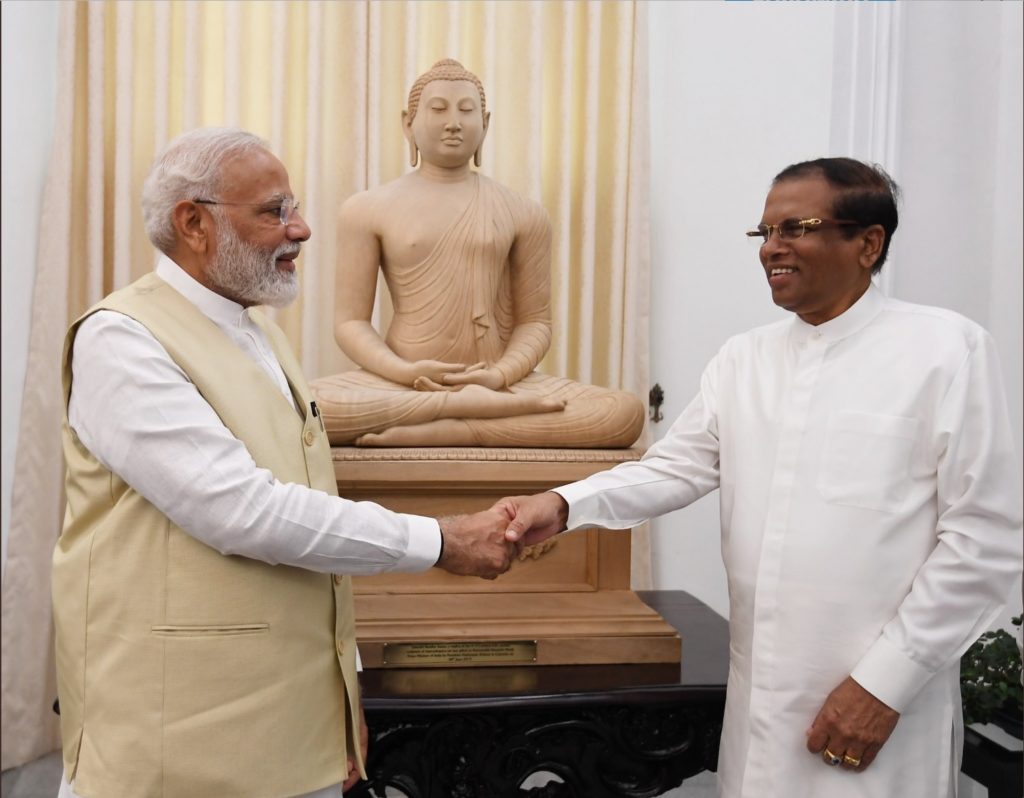
Sri-Lanka and India: In Solidarity againstTerror
Prime Minister Modi’s daylong stopover in Sri Lanka was high in symbolism, mainly meant to offer India’s solidarity and support in combating the menace of terrorism, after Sri Lanka faced violent terrorist attacks on Easter Sunday this year. Modi was the first foreign leader to tour Sri Lanka after the incident and even visited St. Anthony Church, one of the targets of the attacks. Following Modi’s visit to the Maldives and Sri Lanka, reports suggest that the three countries are planning to revive their trilateral National Security Adviser (NSA)-level security dialogue aimed at containing terrorist networks in the IOR. The trilateral dialogue may even be expanded to include Mauritius and Seychelles.
How to create incentives for its neighbors to appreciate its positive intervention in their economic and political affairs without overplaying its hand will remain a prominent foreign policy challenge for India.
Modi’s visit to Sri Lanka and his outreach to political leaders across the spectrum was meant to signal India’s intent to build a more sustainable relationship with Sri Lanka, which will not be at the mercy of a change of the political guard in Sri Lanka or the contours of the Beijing-Colombo dynamic. While the dispensation of the current political regime in Sri Lanka does not automatically mean the waning of Chinese influence and an unchallenged rise of India’s influence, it does afford New Delhi an opportunity to step up the game of what it calls “people-oriented projects” and see them through to implementation. Mention may be made of a recent deal between Sri Lanka, Japan, and India to jointly develop the East Container Terminal at the Colombo Port, close to the China-backed Colombo International Financial City. This project indicates that India is testing out the feasibility of aligning its intent and capabilities with other like-minded powers, be it Japan, the United States or the European Union, in order to provide an alternative to Chinese projects. But whether this will be a part of India’s policy in its neighborhood in the long term remains to be seen.
Creating an Alternative to China
The unique geographical position of the Maldives and Sri Lanka, being India’s neighbors as well as being located amid busy lanes of trade and transit in the Indian Ocean, makes them critical nodes of India’s Indo-Pacific strategy. As such, Modi’s tour was about linking India’s neighborhood policy to its maritime strategy in the IOR. Given the perennial image of India as a “big brother” in the region and its perceived interference in the affairs of its smaller neighbors coupled with China’s increasing forays into India’s traditional sphere of influence, the task is cut out for India’s foreign policy mandarins under Modi 2.0. How to create incentives for its neighbors to appreciate its positive intervention in their economic and political affairs without overplaying its hand will remain a prominent foreign policy challenge for India. In economic terms, it would entail creating a web of relationships of economic interdependence between India and its immediate and extended neighborhood. In political terms, it would mean creating space to build and maintain political assets in these countries that are well disposed to working with India. In the coming years, how New Delhi leverages its material and ideational resources in sync with its political and economic strategies in the neighborhood in order to maintain peace and stability will be key.
***
